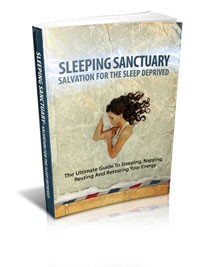 License Type: Giveaway Rights
License Type: Giveaway Rights  File Size: 4,175 KB
File Size: 4,175 KB File Type: ZIP
File Type: ZIP
 SKU: 21652
SKU: 21652  Shipping: Online Download
Shipping: Online Download
Ebook Sample Content Preview:
Most of us remember going to bed early as young children and our bedtime getting progressively later as we progressed into our teen years. As adults, we probably have an idea on the amount of sleep we generally need to feel in optimum condition the following day. We know the effect that a late night will have, especially if it is followed by an early morning and a long day at work.
Most adults require 7-9 hours of sleep a night, although for others it is very individual with many requiring a greater or less need. Young babies under 3 months old, tend to have high levels of melatonin in their circulation and sleep long hours under its influence.
As their pineal gland matures, the biological clock starts to develop regular wake and sleep cycles and babies and young children gradually need less hours of sleep. Young children will still require approximately 10 hours sleep at night and adolescents may require 9- 10 hours a night.
As adults age, they will wake more regularly at night either due to health related reasons or because they are sleeping lighter and their sleep is more often interrupted. Older people often need to sleep during the day to compensate for the disturbed sleep patterns at night With the busy lifestyles, we lead and the attraction of home entertainment and computers, many people are sleep deprived. They go to bed too late and wake up too early and eventually the body will respond physically to this lack of sleep.
Researchers suggest that sleeping before midnight may have significant health benefits particularly to body functions and cardiac health. Research continues to determine if the important factor in the relationship between health and sleep is how many hours a person actually sleeps, or when they actually sleep and if an early bedtime offers health advantages over a later one.
What is definitely emerging in all studies is the reduction in blood pressure readings and decreased circulating fats in those who have the recommended number of hours of sleep at night. Those who sleep before midnight appeared to have less physical symptoms of cardiac disorders than those who slept after midnight.
Most experts speculate that the later we go to sleep, the greater the potential of interfering with our biological clock. This has the potential for the development of significant health problems. Maybe as a child, you used to talk of going to bed early being a means of staying smart, making money and having fewer health problems, and the evidence is definitely supporting this famous children’s rhyme.
The research certainly indicates that people who become disciplined with a more scheduled approach to the time they wake and the time they sleep will have immediate and long-term health benefits. This resets the body clock and reduces the incidence of insomnia.








